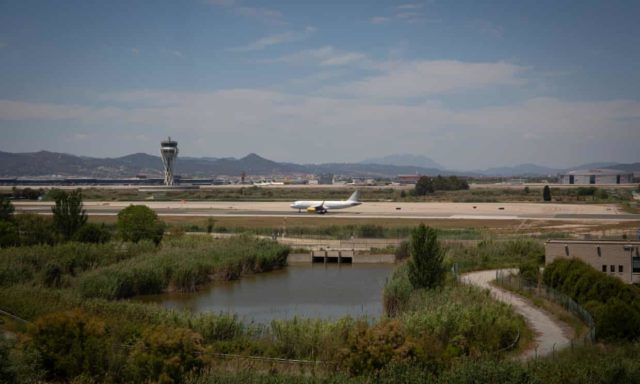In most other European countries, there may be a competition between the capital’s airport and the main provincial airport serving the main commercial center. And this is especially true when the provincial one also serves a unique region that many people would prefer to see become its own country.
But not in Spain, where the airports of Madrid and Barcelona are owned jointly. For those airports, AENA has requested capital expenditures of EUR1.6 billion and EUR1.7 billion, respectively, with the goal of turning Barcelona into an alternative intercontinental hub in Spain.
But, given that Madrid’s Barajas Airport already performs this duty, is it really necessary? The reasoning isn’t quite clear.
It’s also not guaranteed that what the politicians want to be “Europe’s greenest airport” can be enlarged, because that would create a real, live green issue.
Controversial The plan to expand the airport in Barcelona has been approved.
Barcelona’s city council is opposed to a €1.7 billion plan that would see passenger numbers reach 70 million per year.
The Spanish and Catalan governments have agreed on a contentious plan to expand Barcelona Airport, bringing the total number of passengers from 55 million to 70 million each year.
Barcelona city council opposes the €1.7 billion plan, which is sponsored by Aena, the Spanish airports regulator. It will need to be allowed by the European Commission, which has already criticised a previous extension in the Llobregat delta’s protected wetlands.
The proposal was previously denounced by the city council as “a bacchanalia of sectors trapped in the past.”
Raquel Sánchez, the transport minister, announced the deal by saying that the extension would be done with “greatest regard for the environment” and would encourage “sustainable and quality tourism.” By 2030, the project should be completed.
The Catalan regional president, Pere Aragonés, stated that the plan must be implemented if Barcelona is not to “skip the train to the future.” Meanwhile, the city of Barcelona wants all journeys lasting less than 2.5 hours to be completed by train.
The mayor of Barcelona, Ada Colau, called promises that the expansion will boost the local economy “a gigantic fraud.” She claimed that expanding the barcelona airport was part of an old approach that favored “a few corporations and speculators” while encouraging big tourism. “What we require is a forward-looking economy.”
The European Union’s Nature Network 2000 project protects much of the Llobregat delta. The plan calls for extending a runway into La Ricarda’s protected zone, as well as the construction of a third terminal.
In a letter to the Spanish and Catalan governments in May, the European Commission expressed concern that “the adoption and implementation of a special plan for the protection of the natural areas and landscape of the Llobregat delta, as well as an extension of the special protected area to protect the most suitable territories for the conservation of birds, have not been followed up sufficiently.”
The idea, according to José Garca, vice-president of the environmental NGO Depana, is incompatible with the policy of the Spanish and Catalan governments on sustainable development. “A lot of this is posturing so that everyone can say they won,” he added, adding that the agreement was reached during the first of a series of discussions aimed at defusing the Catalan crisis.
He likened the deal to obtaining planning clearance for a home that you can’t afford to build. The fact, he continued, is that the travel industry, on which Spain is strongly reliant, is unlikely to return to pre-pandemic levels very soon, if at all, and that Aena would not be able to raise €1.7 billion.
Garca described it as “emperor’s clothing.” “No one is willing to acknowledge the truth.”
In a written response, Elena Mayoral, Aena’s chief of airport development, stated that international air transport organizations estimate “traffic to restore to pre-pandemic levels between 2025 and 2026, when extension works will begin.”
“The high number of European destinations at the airport makes it the home for intercontinental connections,” she said when asked why a city with a population of 1.6 million needs an airport that can transport 70 million passengers. The largest hub in Europe is located in Amsterdam, which has a population of roughly 800,000 people. The vast majority of connecting passengers (70%) originate outside of the Iberian Peninsula.”
Critics argue that, aside from the proposed expansion’s environmental impact, Catalonia already has three underutilized airports at Girona, Reus, and Lleida.






